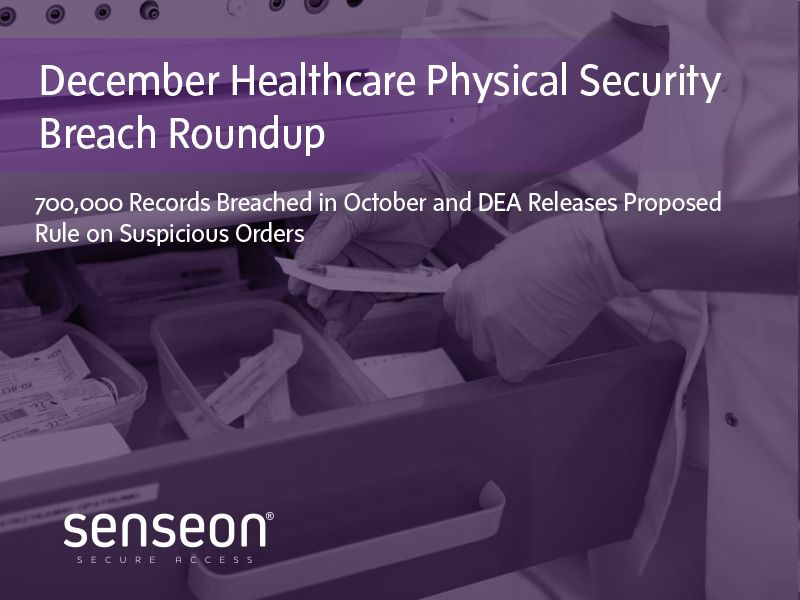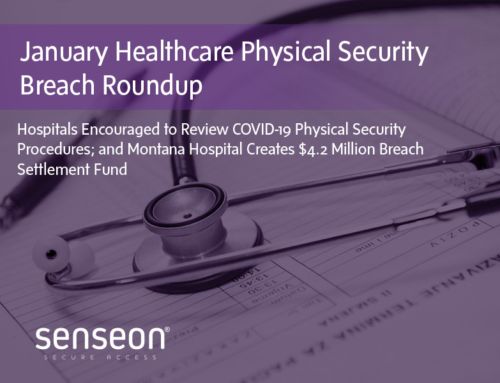700,000 Records Breached in October and DEA Releases Proposed Rule on Suspicious Orders
Take control of the physical data breach and drug diversion risks that threaten your healthcare organization with Senseon’s Physical Security Breach Roundup.
We bring you the most recent physical data breach and drug diversion news each month. If you want to learn more about what you can do to minimize the risk of your facility ending up on this list, we can help.
Physical Breach & Security News
CareSource Breaches Affect Over 28,000
The Office of Civil Rights (OCR) has documented four breaches of paper/films that appear to be affiliated with CareSource. The breaches, all of which have submission dates of 11/11/20, fall under CareSource, CareSource Indiana, Inc., CareSource Kentucky Co., and CareSource West Virginia Co.
The site reports that a total of 28,658 individuals were impacted by these breaches.
Almost 700,000 Records Breached in October
As healthcare security becomes more complex, breaches continue to rise. Becker’s Hospital Review reports 692,490 individuals were affected by healthcare data breaches in October. These numbers represent a total across 35 organizations, including Sisters of Charity of St. Augustine Health System in Cleveland and Presbyterian Healthcare Services in Albuquerque. This stark statistic further emphasizes the need for healthcare facilities to put stopgaps in place to prevent these costly breaches, such as far-reaching physical security systems.
A Year of HIPAA Settlements: 17 So Far in 2020
The OCR has been busy this year, with numerous settlements being announced, including the largest in OCR history from Premera Blue Cross. The 17 settlements reached this year range in size from $25,000 to Premera’s $6.85 million—a stark reminder of the potential cost to hospitals and health systems who are found guilty of violating their responsibility to protect patient privacy.
Other settlements include:
- Agape Health Services: $25,000
- Dignity Health: $160,000
- A Community Hospital Systems entity: $2.3 million
Drug Diversion News
Pharmacy Teams’ Key Role in Preventing Drug Diversion
COVID-19 has made the already difficult task of curbing substance abuse even more challenging.
An article from Pharmacy Times emphasizes the important role that pharmacy teams play in the prevention of drug diversion and misuse, even as they support patients’ ongoing need for access to opioids in managing conditions like chronic pain and other issues. As such, pharmacy teams must remain vigilant in their drug diversion prevention initiatives.
DEA Releases Rule on Suspicious Orders
The Drug Enforcement Administration (DEA) has released its proposed rule that would revise regulations around suspicious orders of controlled substances. The long-awaited rule implements the Preventing Drug Diversion Act of 2018 (PDDA) and outlines procedures that registrants are required to follow regarding orders that are received under suspicious circumstances, or ORUSCs.
The key regulatory changes include:
- New definitions
- Expansion of categories of registrants who are required to report
- Procedures for reporting and identifying suspicious orders
- Record keeping and reporting requirements
Doctor in $6.7 Million Healthcare Fraud Scheme Found Guilty
Texas doctor Grigoriy T. Rodanaia was recently found guilty on 12 counts of healthcare fraud, three counts of aggravated identity theft, along with two counts of accepting kickbacks and making a false statement.
According to prosecutors, Rodonaia issued prescriptions for specially compounded scar creams to military health program beneficiaries. The orders were then directly forwarded to Memorial Compounding Pharmacy (Houston). None of these actions were taken with the patients’ knowledge or consultation.
The prescriptions were billed to the military healthcare program at about $9,000 to $13,000 each. In total, the doctor issued over 600 prescriptions in the name of about 140 beneficiaries, with the program paying about $6.7 million to the pharmacy. Unfortunate cases like this one emphasize the importance of continued monitoring and increased security efforts by healthcare organizations due to internal security threats.
Want to learn more about what modern access control can look like for healthcare? Start here.






